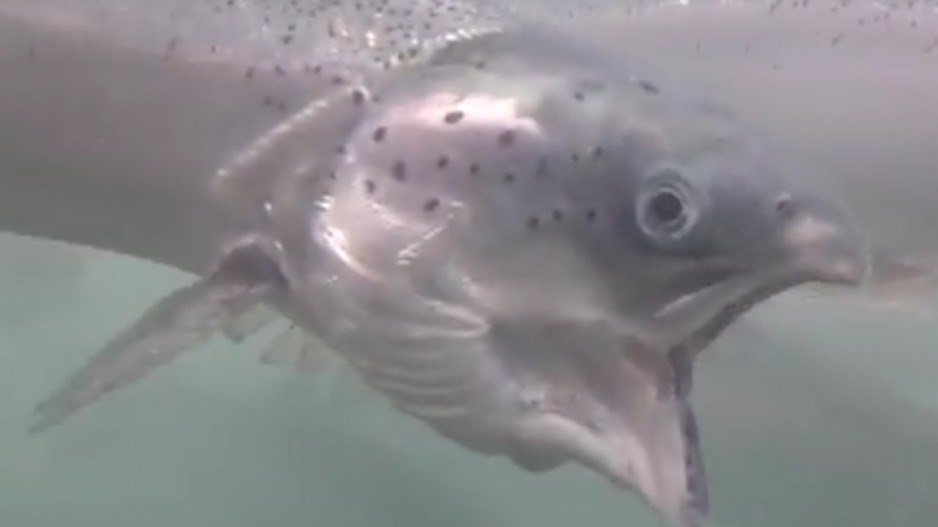When news broke of the escape of more than 300,000 Atlantic salmon from a collapsed fish farm in Washington state on August 19, British Columbians could have been forgiven for thinking: “Washington state has fish farms?”
The salmon farming industry in the state is small compared with B.C.’s and has not experienced the same level of scrutiny and criticism from environmentalists and First Nations.
The incident in Washington resulted in a ratcheting up of anti-fish-farm activism in B.C. First Nations from three different tribal groups in the Broughton Archipelago region – aided by the Sea Shepherd Conservation Society and anti-fish-farm campaigner Alexandra Morton – occupied two fish farms owned by Marine Harvest in the Broughton Archipelago.
Morton, along with local hereditary chiefs, had been conducting observations of the Marine Harvest fish farms – as well as others in the region – prior to the incident in Washington, but the sites were occupied only after the collapse of a net-pen salmon farm in Washington.
Using underwater cameras, First Nations working with Morton captured video that showed thousands of herring trapped inside net salmon pens. The footage also shows Atlantic salmon with what appear to be large sores and lesions, and others that appear to be emaciated or deformed.
On August 24, members of the ’Namgis First Nation began occupying Marine Harvest’s Swanson site; on August 31 Musgamagw Dzawada’enuxw and the Kwikwasut’inuxw Haxwa’mis occupied the firm’s Wicklow site.
Ian Roberts, director of public affairs for Marine Harvest, noted the irony of B.C. fish farms being targeted in response to an incident in Washington state.
“I’ve always found it fascinating that the philanthropy money that pours into British Columbia from the United States literally passes through Washington, where there’s an active salmon farming business – as there is in Maine,” he said.
“So Americans do farm Atlantic salmon, but we’ve just never seen American money used to fight American salmon farming. It seems to be Canadian-specific.”
Roberts said the handful of protesters who have set up camp on the docks of Marine Harvest’s two fish farms have not interfered with the operations, although the company did suspend the harvesting that it had planned to do at its Swanson farm while the occupation continued.
But Bob Chamberlin, who is the elected chief of the Kwikwasut’inuxw Haxwa’mis, said for every First Nations person in B.C. who supports fish farms, nine oppose it.
“I’ve travelled virtually all of British Columbia and I can tell you that 90% of the First Nations in B.C. are opposed to open-net fish farms,” said Chamberlin, who is vice-president of the Union of BC Indian Chiefs and chairman of the First Nations Wild Salmon Alliance.
There is only one successful land-based salmon farm in B.C. – Kuterra LP in Port McNeill, which is owned and operated by the ’Namgis. After more than three years in operation, Kuterra expects to break even this year.
Of the 300,000 Atlantic salmon that escaped in Washington, about half were recaptured, according to state officials. But Chamberlin said there are reports of First Nations in Sechelt and Tofino catching Atlantic salmon.
Although the likelihood of escaped Atlantic salmon surviving and colonizing Pacific waters is low – based on past failed attempts to deliberately establish Atlantic salmon in B.C. waters – there are concerns that farmed fish interacting with wild ones could transmit diseases.
In response to the August 19 incident, Washington state’s Department of Natural Resources imposed a moratorium on new fish-farm permits until an investigation is complete.
Chamberlin has written the governor of Washington asking for a meeting. He wants to urge the governor to not allow salmon farming to expand in Washington state the way it has in B.C.
Salmon farming experienced a significant expansion throughout the 1980s and ’90s in B.C. There are now more than 100 licensed sites, with more than 70 active fish farms operating at any given time. There are just four salmon farms in Washington state.
Though the industry in B.C. is dominated by Norwegian seafood companies – Marine Harvest and Cermaq – it’s a Canadian company, Cooke Aquaculture in New Brunswick, that operates salmon farms in Washington.
Environmentalists like Morton say that open-net salmon farms pose a direct threat to wild salmon stocks by spreading sea lice and other diseases to wild stocks.
Large returns of pink salmon in recent years seem to defy that theory, and many fisheries scientists believe declines in certain wild salmon stocks – chinook and sockeye, for example – are more likely the result of climate change, habitat loss and other factors.
But the topic of salmon farming in B.C. could become an issue for the new NDP government, which has endorsed the United Nations Declaration on the Rights of Indigenous Peoples. Chamberlin is hopeful that will arm First Nations in B.C. with the right to say no to open-net salmon farming.
While the federal government issues licences, the province issues tenures, which means it can decide where the fish farms are located.
There is a moratorium on new fish-farm tenures, and B.C. Agriculture Minister Lana Popham told Business in Vancouver it will continue until a report on fish farming by the Minister of Agriculture’s Advisory Council on Finfish Aquaculture is completed at the end of this year.
Popham, who met with First Nations leaders at an NDP caucus meeting last week, as well as with federal Fisheries Minister Dominic LeBlanc, also said her government is committed to enacting a key recommendation of the Cohen Commission, which called for the relocation of open-net fish farms away from migration routes of wild salmon.




